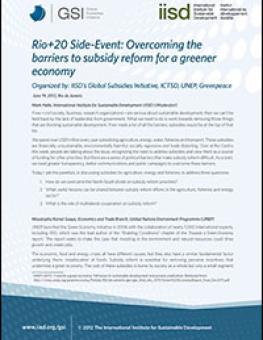
Rio+20 Side-Event: Overcoming the barriers to subsidy reform for a greener economy
RIO DE JANEIRO - 19 June 2012 - Each year, enormous sums are spent on subsidies that undermine sustainable development.
Globally, over US$ 2 billion is spent each day subsidizing fossil fuels, agriculture and fisheries. Subsidies to fossil fuels undermine global efforts to combat catastrophic climate change, and are widely acknowledged as an ineffective instrument for supporting the poor. Subsidies to agriculture encourage over-production and are enormously trade distorting. And subsidies to fisheries have contributed to the depletion of fish stocks, the majority of which are over-exploited.
But despite the harm that many subsidies do to the environment, social equity and economic growth, they are notoriously difficult to reform. Members of the G-20 and APEC committed to phase out inefficient fossil-fuel subsidies in 2009, yet most countries have not taken strong measures to achieve the pledge. Meanwhile, the WTO Doha Round has been grappling with reform of agricultural and fisheries subsidies for over a decade. Subsidy reform is featured on the negotiating agenda for Rio+20 but with a very uncertain outcome.
This event brought together leading experts from fisheries, agriculture and energy sectors to discuss what the major barriers are to subsidy reform, how these can be overcome and who the critical actors are to affect change at Rio and beyond. Discussion questions included:
- How to overcome the North-South divide on subsidy reform priorities?
- What useful lessons can be shared between subsidy reform efforts in the agriculture, fisheries and energy sector?
- What is the role of multilateral cooperation on subsidy reform?
Speakers
Session moderator:
- Mark Halle, Executive Director, IISD-Europe
Panelists:
- Moustapha Kamal Gueye, Economics and Trade Branch, the United Nations Environment Programme (UNEP)
- Professor Rashid Sumaila, University of British Colombia
- Ammad Bahalim, International Centre for Trade and Sustainable Development
- Steve Kretzmann, Executive Director and Founder, Oil Change International
You might also be interested in
Increased Support Needed to Achieve India's Clean Energy Goals
India is on track to achieve many of its 2030 clean energy goals but needs to step up government support measures to accelerate the deployment of offshore wind, electric vehicles, and green hydrogen, according to a new report.
Ending Export Credits for Oil and Gas: How OECD countries can end 2024 with a climate win
For a year now, Organisation of Petroleum Exporting Countries (OECD) governments have been negotiating an agreement that could put an end to oil and gas export finance. Following the acrimony in Baku, this would be a very real way for the OECD to show policy coherence, respond to calls from the poorest countries to stop subsidizing fossil fuels, and shift public finance to solutions.
Fossil Fuel Production, Renewable Energy, and Subsidy Reform in Nationally Determined Contributions 3.0
This policy brief provides an analysis of the critical benchmarks and recommendations necessary for aligning nationally determined contributions (NDCs) with the 1.5 °C target.
COP 29 Outcome Moves Needle on Finance
In the last hours of negotiations, concerted pressure from the most vulnerable developing countries resulted in an improved outcome on the finance target, with a decision to set a goal of at least USD 300 billion per year by 2035 for developing countries to advance their climate action.